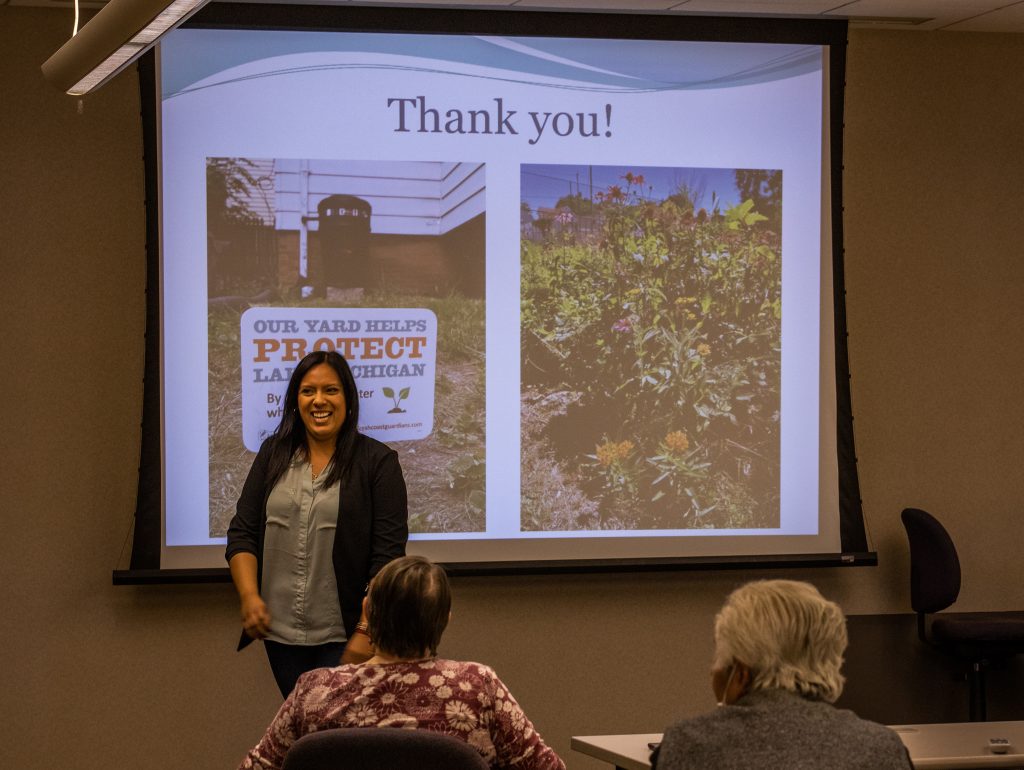Nancy Retana is Clean Wisconsin’s new Resilient Communities Program Director. As Clean Wisconsin builds on the success of the Resilient Communities work in Milwaukee and expands to other communities across Wisconsin, we talked with Nancy about her vision for the future of the program.
Welcome to Clean Wisconsin, Nancy! What are you most excited about accomplishing in your role as Clean Wisconsin’s Resilient Communities Program Director?
Thank you! I’m excited about collaborating with our team of experts at Clean Wisconsin and the community stakeholders that support our work. I want to build upon my predecessors’ work and scale up the use of green infrastructure through education, outreach, policy, and on-the-ground installation of green infrastructure through our continued partnership with Milwaukee Metropolitan Sewerage District.
Is there a model of community resiliency that informs your vision for the program?
Clean Wisconsin’s green infrastructure work within Milwaukee’s 30th Street Corridor is a model that can be replicated throughout the state. By building relationships with trusted community leaders and working alongside them to empower the community, we have seen that this model works. By providing resources, following evidence-based approaches, helping community members organize, and amplifying their voices, we are building community resiliency.
What attributes make a community resilient?
A resilient community is one that is prepared for future environmental challenges. The community is prepared to take deliberate, collective action in the face of environmental harm. They have developed physical, social, and psychological resources that function as a buffer against the negative effects of environmental injustices. Some key elements that make a community resilient include a shared collective history, community networks, established communication systems, public health and infrastructure investment, local leadership, availability of resources, economic vitality, environmental mitigation planning, and an element of hope.
Climate change is affecting Wisconsin at every scale, from disruptions in agricultural productivity to individual residents coping with urban heat waves and flooding. Why is it important to work at the community scale when confronting climate issues?
Global movements start at the community level. Climate change can be addressed from the ground up, led by affected communities and local leaders. Rather than thinking about climate issues as one large, overwhelming challenge, thinking at the community scale allows us to break apart the effects of climate change as many local issues. By shifting focus to specific places and groups of people, we can begin tackling climate issues from a many different angles. When more people think about these issues locally, we build a collection of small actions that accumulate as significant change at the global scale.
Environmental risks are disproportionately borne by disadvantaged communities. How can these communities access the resources they need to build resiliency?
During his first weeks in office, President Biden issued Executive Order 14008 on Tackling the Climate Crisis at Home and Abroad, establishing the Justice40 Initiative. Through Justice40, the Federal government is, for the first time in history, working to ensure that at least 40 percent of climate and clean energy investment benefits flow to disadvantaged communities. This is the kind of approach we need to be seeing more. Clean Wisconsin’s approach to increasing community resiliency is holistic. Our policy, science, law, and advocacy work enable systematic change at the community, state, and national levels. We take actions to ensure a clean and healthy future for all Wisconsin communities by engaging with those who have historically suffered from inequitable distribution of resources.
Can you share a success story from a resilient community that has inspired your work?
Yvonne McCaskill, a retired public-school teacher, and long-time resident of the Century City Triangle Neighborhood of Milwaukee, successfully organized for local change and built a stronger community because of it. Yvonne founded the Century City Triangle Neighborhood Association (CCTNA), a grassroots resident-led level, advocacy group. CCTNA has partnered with Clean Wisconsin, in collaboration with Metropolitan Milwaukee Sewerage District (MMSD) for the past nine years on environmental stewardship initiatives, which included green infrastructure and environmental stewardship education. Our partnership with CCTNA engages with all facets of the local population – the grassroots advocacy group, local youth that assist with painting and installing rain barrels, and even engagement of local seniors. The community has become a model of resiliency, a success story in the northwest area of Milwaukee.
How can Clean Wisconsin members and environmental advocates across Wisconsin get involved with the Resilient Communities Program and support your work?
Our work cannot be done without the support of our members, environmental advocates, and partners. Advocate for resiliency in your own community, be civically engaged to the best of your ability, and stay connected with Clean Wisconsin as we grow the Resilient Communities Program. If you live in Milwaukee, you can get involved with the program by volunteering. Clean Wisconsin has installed hundreds of rain barrels and green infrastructure solutions in Milwaukee. We could not do this without support from our partners, MMSD, the local youth volunteers, and other community volunteers.

